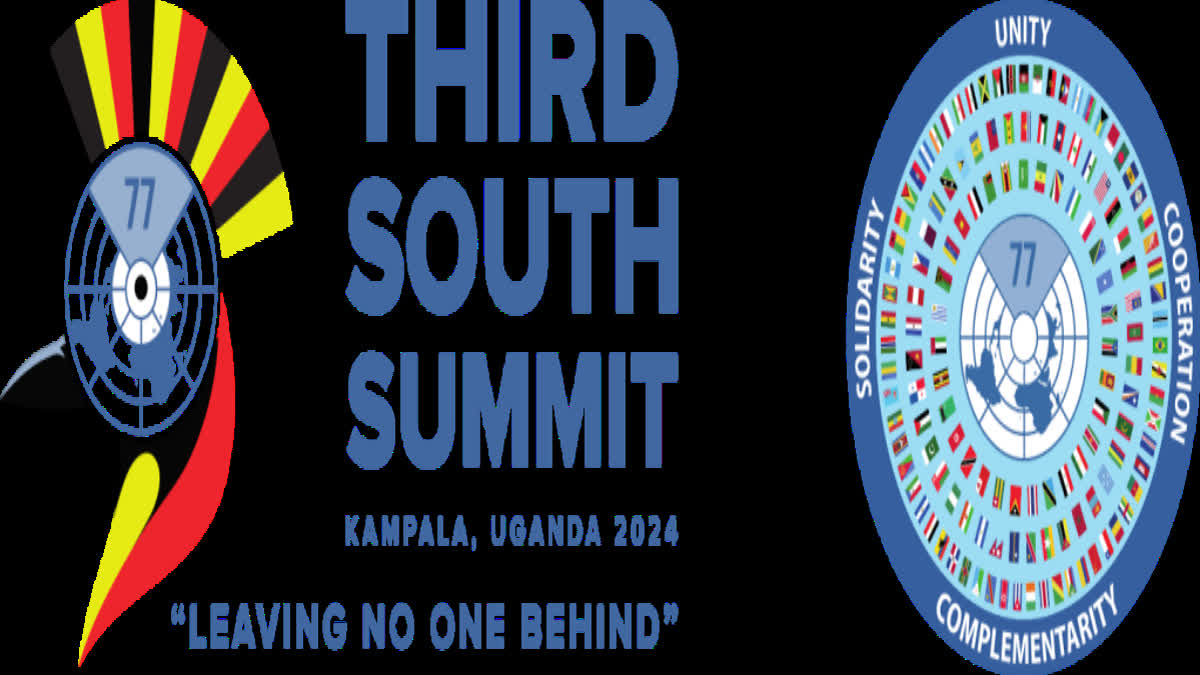New Delhi: After a gap of nearly two decades, the Group of 77 (G77), the largest coalition of developing nations in the United Nations (UN), is holding only its third summit-level meeting in Kampala, Uganda, since its inception in 1964. Minister of State for External Affairs V Muraleedharan will be representing in this year’s G77 Summit being held from January 21 to 22 in the Ugandan capital with the theme ‘Leaving No One Behind’. According to a statement issued by the Ministry of External Affairs, the theme “sits in line with India’s vision of Vasudhaiva Kutumbakam or ‘the World is one Family’”.
The G77 Summit is being held immediately after the annual Non-Aligned Movement (NAM) Summit also hosted by Uganda in Kampala. The G77 Summit is being held close on the heels of India’s presidency of the G20, the inter-governmental forum comprising the world’s 20 major economies. During its presidency in 2023, India brought the African Union (AU) on board the G20 with New Delhi projecting itself as the voice of the Global South.
What is the G77 and what are its aims?
The G77 was established on June 15, 1964, by 77 developing signatory countries of the “Joint Declaration of the Seventy-Seven Developing Countries” issued at the end of the first session of the United Nations Conference on Trade and Development (UNCTAD) in Geneva. Although the members of the G77 increased to 135 countries, the original name was retained due to its historic significance.
As the largest coalition of developing countries in the United Nations, the Group of 77 provides the means for the Global South to articulate and promote its collective economic interests and enhance its joint negotiating capacity on all major international economic issues in the UN system, including South-South cooperation. The South Summit is the supreme decision-making body of the Group of 77.
The G77 operates based on consensus among its members. It does not have a permanent Secretariat, but relies on a system of rotating chairmanship among its member countries. The G77 plays a crucial role in various UN bodies, including the General Assembly, UNCTAD and the Economic and Social Council (ECOSOC). The group provides a platform for developing countries to voice their concerns and advocate for policies that address their development needs.
The G77 promotes South-South cooperation, which involves collaboration among developing countries to share knowledge, technology and resources. This is seen as a means to foster economic growth and development. The group addresses a wide range of issues, including trade, finance, technology transfer, debt relief and sustainable development.
When and where were the earlier G77 Summits held?
The G77 Summit, also known as the South Summit, is the supreme decision-making body of the group. The First South Summit took place in Havana, Cuba, in 2000. The Second South Summit was convened in Doha, Qatar, in 2005. In practice with the G77’s principle of geographic rotation, this time the Summit is being convened in Africa.
The First South Summit was held in 2000, 26 years after the inception of the G77. This year’s summit in Kampala is being held nearly two decades after the last summit that was held in Doha. There are several factors why these summits are held after long gaps of time.
The G77 represents a diverse set of countries with varying economic interests, priorities and policy preferences. Negotiating and reaching a consensus on various issues can be a complex and time-consuming process. The need to accommodate the diverse perspectives of member countries may contribute to the infrequent scheduling of summits.
G77 Summits typically address a broad range of issues, including economic development, trade, finance and global governance. The time it takes to set a comprehensive agenda that reflects the current priorities and challenges facing developing countries contributes to the infrequent occurrence of summits.
These apart, hosting an international summit involves significant logistical and diplomatic preparations. Member countries need time to coordinate their positions, prepare policy documents and organise the necessary infrastructure for the summit. The logistical challenges and coordination efforts required for such events result in longer intervals between summits.
The global economic and political landscapes also influence the timing of G77 Summits. Major global events, economic crises, or shifts in geopolitical dynamics impact the decision to convene a summit. Member countries choose to time the summits to address pressing issues or take advantage of favourable conditions.
Some member countries of the G77 may face resource constraints, making it challenging for them to host or actively participate in frequent summits. The financial and administrative burden associated with hosting a summit could also be a limiting factor.
The issues and challenges facing developing countries evolve over time. Summits may be scheduled when there is a perceived need to address new or emerging challenges or when there is a significant development in the international arena that requires collective action.
The G77 operates on the principle of consensus and reaching an agreement among a large and diverse group of countries can take time. Deliberations on key issues often require extensive negotiations and consultations among member countries, leading to longer intervals between summits.
However, notwithstanding the periodicity of the G77 Summits, an annual meeting of the Foreign Ministers of the G77 countries is convened at the beginning of the regular session of the UN General Assembly in New York. Periodically, sectoral ministerial meetings in preparation for UNCTAD sessions and the general conferences of UNIDO and UNESCO are convened.
What is the significance of the Third South Summit being held in Kampala?
With the theme ‘Leaving No One Behind’, the Third South Summit hopes to bring a new cooperation dynamic among the 134 member states of the G77 in a more competitive world. The summit is aimed at boosting South-South Cooperation, including in the areas of trade, investment, sustainable development, climate change, poverty eradication and digital economy.
According to Ruchita Beri, consultant at the Manohar Parrikar Institute of Defence Studies and an expert on Africa, one of the major grievances of the countries of the Global South is that they have a limited voice in the global governance institutions.
“By bringing the AU on board the G20 during its presidency, India has played a major role in bringing the voice of the Global South to the forefront,” Beri told ETV Bharat. In this context, she said, the hosting of both the NAM and G20 Summits in Uganda this year is important for Africa as a whole.
“The world is going through several crises, including the wars in Gaza and Ukraine,” Beri said. “The world is divided on how to resolve these crises. It may be recalled that India is playing a leading role as the voice of the Global South.”
She further said that both the G77 and NAM Summits being held in Uganda showcase the importance of Africa’s voice in dealing with the unequal global governance order. “What has happened is that the Global South has attained the centre stage of international politics,” Beri said.
Read more: EAM Jaishankar to attend NAM meet in Uganda, travel to Nigeria next


